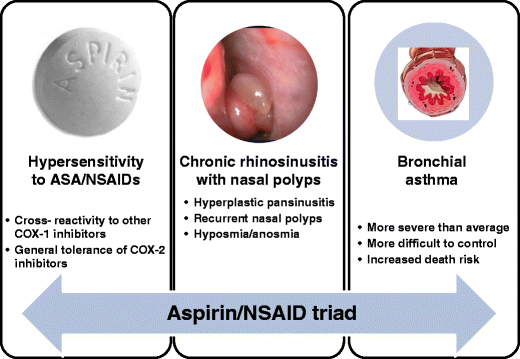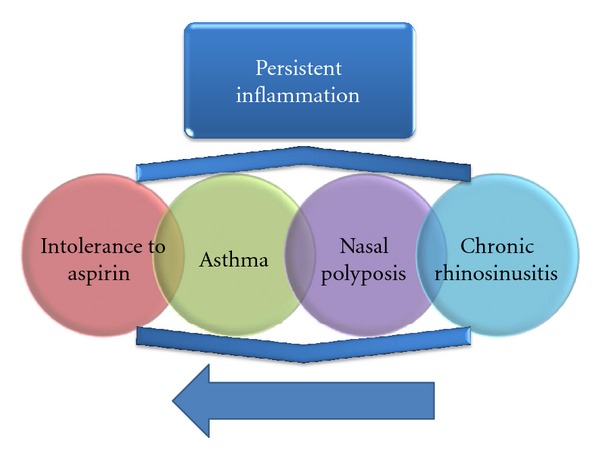Contents
Introduction to AERD
Aspirin-Exacerbated Respiratory Disease (AERD) is a chronic medical condition that effects the respiratory system and is characterized by sensitivity to aspirin and other nonsteroidal anti-inflammatory drugs (NSAIDS). This complex disorder, also known as Samter’s Triad or aspirin-induced asthma, presents unique challenges for both patients and healthcare providers. Understanding AERD is crucial for proper diagnosis and effective management of this condition.
The Three Main Features of AERD
Aspirin-Exacerbated Respiratory disease is defined by three primary characteristics that form the classic Samter’s Triad: asthma, chronic rhinosinusitis with nasal polyps, and sensitivity to aspirin and other NSAIDs. Patients with AERD typically experience moderate to severe asthma than can be difficult to control. They also suffer from persistent inflammation of the nasal passages and sinuses, accompanied by the growth of soft, painless tissue growth called nasal polyps. Additionally, individuals with AERD react adversely to aspirin and NSAIDs, often experiencing respiratory symptoms or exacerbations of existing respiratory issues.
Age of Onset and Development
Most people develop AERD symptoms in the 30s and 40s, although the conditions can appear at any age. The onset is typically gradual, with patients first experiencing respiratory symptoms such as nasal congestion or asthma. Over time, they may develop nasal polyps and notice severe reactions when taking aspirin or NSAIDs.

Causes of AERT and Its Relation to Aspirin Sensitivity
The exact cause of Aspiring-Exacerbated Respiratory remains unclear. Researchers believe it involves abnormalities in the metabolism of arachidonic acid, a fatty acid involved in inflammation. When individuals with AERD take aspirin or NSAIDs, it can trigger an overproduction of inflammatory molecules called leukotrienes, leading to respiratory symptoms and exacerbations. AERD is closely related to aspirin sensitivity, but not all people with aspirin sensitivity have AERD. In AERD, aspirin sensitivity is specifically linked to respiratory symptoms and is part of a broader constellation of respiratory issues. Understanding this distinction is crucial for proper diagnosis and treatment.
Aspirin Desensitization: A Treatment Option
For many AERD patients, aspirin desensitization offers a promising treatment approach. This process involves gradually introducing increasing doses of aspirin under medical supervision to build tolerance. The desensitization protocol typically begins with an initial assessment and preparation, followed by controlled administration of aspirin in a medical setting. Doctors gradually increase the aspirin dosage over several hours or days while closely monitoring for adverse reactions. Once desensitized, patient maintain daily aspirin therapy. Benefits of successful desensitization can include improved asthma control, reduced need for sinus surgeries, and slowed regrowth of nasal polyps.
Maintaining Desensitization and Potential Relapse
Once desensitized, patients must continue taking a daily maintenance dose of aspiring to maintain their tolerance. If aspirin therapy is interrupted for more than 48 hours, patients may lose their desensitization and need to repeat the process. This highlights the importance of consistent adherence to the prescribed aspirin regimen. Patients with AERD need to be aware of other medications that contain aspirin or NSAIDs, including over-the-counter pain relievers, cold medicines, some antacids, heartburn medications and certain prescription pain medications. Always check with a healthcare provider or pharmacist about the safety of any medication if you have AERD. See Osprey Lifestyle gear for hiking, biking and travel.
Additional Considerations for Aspirin Sensitivity
Aspirin sensitivity can also appear in in other ways beyond AERD. Some individuals may experience skin reactions, such as hives, or angioedema, when taking aspirin. In rare cases, aspirin can cause anaphylaxis, a severe and potentially life-threatening allergic reaction. Despite its potential risks for those with AERD, aspirin remains a widely used medication for various purposes, including prevention of heart attacks and strokes in high-risk individuals and management of inflammatory conditions like rheumatoid arthritis. Learn more about Ritual Multi Vegan Supplements.
AERD presents unique challenges for affected individuals, but with proper understanding and management, many patients can achieve improved quality of life. Aspirin desensitization offers a promising treatment for many, while ongoing research continues to enhance our understanding of this complex condition. As always, this paper is for information purposes only. If you suspect you have AERD or aspirin sensitivity, consult with an allergist or immunologist for proper evaluation and personalized treatment recommendations.
Barry Schustermann
Follow me on X @BarrySchust
Follow me on Facebook @Barry Schustermann
External references:
- American Academy of Allergy, Asthma & Immunology: https://www.aaaai.org/conditions-treatments/related-conditions/aspirin-exacerbated-respiratory-disease
- Asthma and Allergy Foundation of America: https://www.aafa.org/aspirin-exacerbated-respiratory-disease/
- National Heart, Lung, and Blood Institute: https://www.nhlbi.nih.gov/health-topics/aspirin-exacerbated-respiratory-disease
- American College of Allergy, Asthma & Immunology: https://acaai.org/allergies/types/aspirin-allergy/
- World Allergy Organization: https://www.worldallergy.org/education-and-programs/education/allergic-disease-resource-center/professionals/aspirin-exacerbated-respiratory-disease




2 thoughts on “Navigating Aspirin-Exacerbated Respiratory Disease”
Comments are closed.